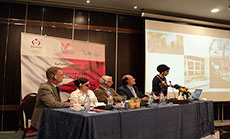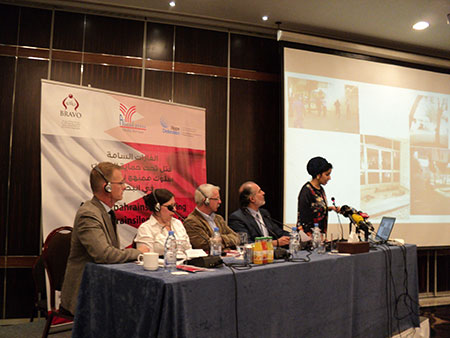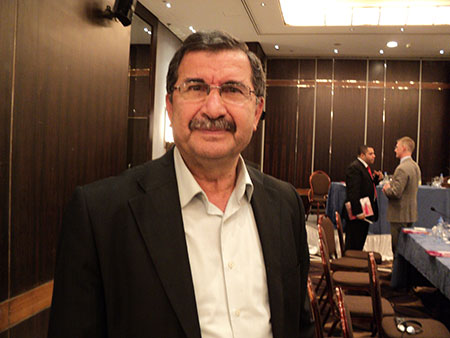
CS Gas: A Silent Killer

Rahil Merhi
"That feeling was killing me as my daughter lay in terrible pain and moaned, she didn't want to die! This time, we were the victims of tear gas," said Dr. Nada Dhaif as she addressed the academics, doctors, activists, senior figures, and journalists at the "Conference on Tear Gas: Silent Killing in Bahrain", which was held at the "Crowne Plaza" in Hamra, Beirut on July 3rd, 2013.
Organized by "Abaad Press", "Bravo", and "Hope Defenders", the conference highlighted the ongoing crackdown on the peaceful protestors in Bahrain, particularly the tortured victims of CS gas (tear gas).
 The conference organizers wished to reach out for all international organizations and senior figures to help launch inquiries into the human rights violations the Bahraini regime are committing against their own people every single day.
The conference organizers wished to reach out for all international organizations and senior figures to help launch inquiries into the human rights violations the Bahraini regime are committing against their own people every single day.
One of the world's most ancient universities, "Trinity College" (also known as "The University of Dublin") had analyzed samples of poisonous gas grenades taken from Bahrain in 2012. A scientific conference was held in Dublin afterwards (May 2013).
"Both the university study and the conference have back-grounded the conference we are now holding," said Dr. Dhaif, Chairperson of Bravo ("Bahrain Rehabilitation and Anti-Violence Organization"), as she presented her update on the current crisis in Bahrain.
Bravo chairwoman recalled how she, along with the rest of the medical staff in "Salmaniyah Medical Complex", were taken prisoner by the Bahraini policemen and subjected to physical and psychological torture, just because they had been treating the wounded protestors taken to the hospital. "Up to this day, four doctors are still imprisoned," she informed the attendees. "It is a miracle that I am here! Hadn't it been for providence and the interference of Prof. Damian McCormack and his colleagues to push the Bahraini government to release us, we would have still been imprisoned."
Displaying different pictures taken in Bahrain, Dr. Dhaif highlighted the fact that mosques and civilians' homes were attacked, including the Bahraini human rights activist, Mr. Nabil Rajab's home. "And what's even worse," continued Dr. Dhaif," is that 65% of the victims of tear gas grenades have suffered suffocation; whereas 35% suffered injuries and fractures! So just imagine how close to protestors the police forces are getting whenever they attack! But the oddest thing about it is that the authorities are faking stories on a serial killer on the loose!"
She told stories of tormented civilians and children, including two who were tortured to death. She also mentioned the story of a sixteen-year-old boy who lost an eye when a grenade launched from a close distance hit his head. The boy was taken to Dublin, Ireland for treatment. "But what about all the other victims?! Can they all be taken abroad for treatment?!"
The Bahraini doctor as well displayed charts, explaining that the regions the Bahraini police forces targeted the most were of a Shiite majority; whereas the properties of the reigning family were absolutely safe."
"For every victim, the average number of grenades is 2 or 3, and every grenade costs 30$, so can you imagine how much money has been paid to harm the Bahraini people?!" Dr. Dhaif also explained that 53% of the victims were old, 25% were young, and 9% were fetuses. "Were the old and the fetuses protesting, too, when they were attacked?!" Dr. Dhaif exclaimed.
Following Dr. Dhaif's presentation, three researchers lectured:
Head of Bravo's Advisory Board, Prof. Damian McCormack, presented an overview of "TCD Tear Gas Analysis and Chemical Weapons Convention".
Ms. Helen Close of "Omega Research Foundation" then presented "Responses to the Use of Tear Gas".
Dr. Richard Sollom, Director of "Emergencies and Special initiatives with Physicians for Human Rights", lectured on "Weaponizing Tear Gas: Bahrain's Unprecedented Use of chemical Agents against Civilians".
 International law lecturer, also retired Lebanese Brigadier General Amine Hoteit was among the attendees. He saw that the US administration was keeping quiet about the Bahraini government's violations against their people because they are "on good terms" since the Bahraini government offered one of its islands to the US Navy's Fifth Fleet, the third largest fleet in the world.
International law lecturer, also retired Lebanese Brigadier General Amine Hoteit was among the attendees. He saw that the US administration was keeping quiet about the Bahraini government's violations against their people because they are "on good terms" since the Bahraini government offered one of its islands to the US Navy's Fifth Fleet, the third largest fleet in the world.
"The Bahraini security forces have violated the international law and human rights, particularly by using CS gas intensively," Mr. Hoteit told us, "but I believe that conferences like this will support the Bahraini people. After all, it is only a matter of time before they reclaim their rights."
Another activist from Bahrain, Mr. Ali Fakhrawi, the executive vice president and financial secretary of "Hope Defenders for Democracy and Freedom of Speech", informed "al-Ahed" that the Bahraini regime began to use tear gas after "Bahrain Independent Commission of Inquiry" (BICI) looked into the policemen's use of stun bullets and live rounds almost two years and a half ago, "The regime thought they could get away with it, killing people silently with tear gas grenades. It is different from shooting one with a bullet."
Mr. Fakhrawi as well demanded that all activists in the world act in support of Bahrain.
The lecturers and participants hoped that coverage provided to such conferences, the ongoing peaceful protests in Bahrain, activists' movements, and the international efforts made to reduce violence against the Bahraini people would eventually guide the Bahraini people where they want: a peaceful Bahrain with no stun bullets, tear gas, or brutal crackdowns on peaceful protestors- a country where both Shiite and Sunni Bahrainis can enjoy equal and rightful citizenship provided by their government.
Source: Al-Ahed news



